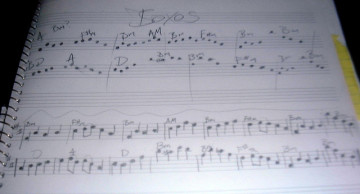Learn Music Theory from Free Videos

Can you write great music without knowing music theory? In many genres — particularly less technical popular genres — the answer is “absolutely.” But don’t dismiss music theory just because you can. It’s pretty useful and awesome stuff to know for any musician.
Even if you don’t play classical, jazz or any of the other genres that usually require advanced knowledge of theory, learning how music works will undoubtedly expand your creative horizons. It will make you a better composer, open up new options in your performance, and help you communicate with other musicians and producers in the recording studio.
Now that we have this thing called the internet, there’s no excuse not to at least dip your toe in the many free streaming videos presenting an education in music theory. Remember, learning music theory is about learning how music works. Too often, musicians are turned off by lessons that require hours of studying music notation before actually getting to the good stuff — that’s only one way to learn. Some of the videos below take a completely different approach, and we encourage you to bounce around to find an angle you enjoy. We promise you that learning music theory — while not required — will make you a more well-rounded musician.
We curated this list of videos for beginners. There are plenty of resources out there for musicians who want to get into more advanced music theory topics, and if you’re looking for advice on a specific aspect of music theory, Google away.
Music Theory Lesson Hacking Videos
Howard Goodall – How Music Works
Goodall’s four-part series on the basics of how music works is a great introduction to music theory for beginners. The videos give a brief, digestible overview of the four building blocks of song: Melody, Rhythm, Harmony and Bass. You won’t be a music theorist after watching, but you’ll be thinking in the right direction and ready for more a more in-depth education.
Michael New – Music Theory Fundamentals
Music theory is traditionally taught on the keyboard and the whiteboard, as it’s the easiest way to visualize notes and the relationships between them. For a traditional approach to learning music theory, New’s videos are clear and concise, and focus on how chords are built from their constituent notes.
Vi Hart – Twelve Tones
In just one half hour, “mathemusician” Vi Hart gives a hilariously edu-taining whirlwind tour of several key concepts underlying music theory. Though by no means a comprehensive academic study on how music works, it is an eminently accessible analysis of some of the more advanced concepts behind the 12-tone scale that comprises all Western music.
Leonard Bernstein – The Unanswered Question
If learning music theory notation-first bores the hell out of you, or if you seek a more intellectual engagement with the inner workings of music, there is no finer place to start than Bernstein’s series of Harvard lectures from 1973. Even though the subject matter is quite heady, only a general familiarity of music is required to appreciate the insight Bernstein gives in six incredible videos spanning the entire history of music (at least up until 1973). For our money, this one of the best video series ever made on the subject of music.
Andrew Furmanczyk – Learn Free Music Theory
The most popular free music theory lesson series on YouTube is taught by the affable, spiky-haired Furmanczyk on a big ‘ol whiteboard. This is absolute beginner-level stuff, taught in the traditional fashion of learning music notation first — starting with the kind of music theory you’d be taught in your elementary school music class. No shame in starting at square one, though! The series critically lacks any musical examples, and isn’t the most engaging in terms of content or production value. But what it lacks in pizazz, it makes up for in being well-paced, thorough, and of course, free.






















